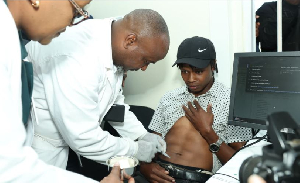Regional News of Thursday, 24 January 2008
Source: GNA
A day's sensitization workshop on NSPS ends in Koforidua
Koforidua, Jan. 24, GNA - The Ghana Living Standard Survey (GLSS 2000), the poverty profile of Ghana, indicates that an estimated 40 per cent of Ghanaians are poor.
This refers to citizens who have the capacity to meet their basic nutritional needs but are unable to cater for additional necessities such as health, shelter, clothing and education. An additional 14.7 per cent of the population is afflicted by extreme poverty and are unable to cater for basic human needs including their nutritional requirements and suffer from poverty across generations.
The Programme Co-ordinator of the Ministry of Manpower, Youth and Employment, Mrs Angela Asante-Asare, said this at a day's workshop on the National Social Protection Strategy (NSPS) at Koforidua on Wednesday.
The NSPS is a programme document developed by the Government of Ghana to enhance the capacity of poor and vulnerable persons by assisting them to manage unemployed, sickness, disability and old age. She said the programme would also provide a framework for governments and civil society to support the extremely poor to fulfil their fundamental human rights as enshrined in the Universal Declaration of Human Rights (1948) and other international and national legislative instruments.
Mrs Asante-Asare said the NSPS would achieve its poverty reduction goals by implementing the Livelihood Empowerment Against Poverty (LEAP) which is a social grants scheme that would provide target groups with a reliable and cost-effective cash transfer to support their basic human needs.
She said the successful implementation of the strategy would provide safeguards and empower individuals and households living under extreme conditions of poverty to become responsible managers of their livelihoods and claim their societal rights and entitlements. Mrs Asante-Asare said the benefits of the interventions would be recycled from the individual to the community and ultimately to the nation at large and would be manifested by improvements in overall standards of living.
She explained that the strategy was founded on the philosophy that when all Ghanaians are given the opportunity they could contribute towards the process of transforming Ghana into a middle income country by the year 2015.
She said Ghana is the first country in West Africa to implement such social protection strategy. The Eastern Regional Minister, Mr Kwadwo Asiedu-Afram, said since the government took office in 2001, several interventions had been implemented to improve the standard of living of the average Ghanaian. He said it was not the intention of the government to introduce a welfare state but to assist a section of the society that is economically handicapped.












